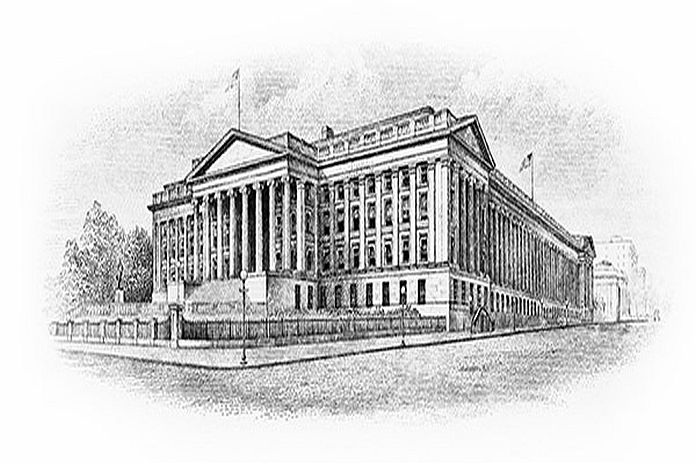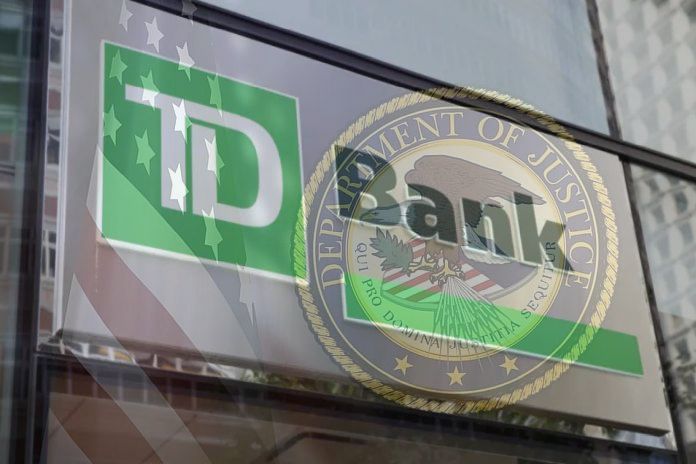By Attorney General Merrick B. Garland
Today, TD Bank pled guilty to multiple felonies, including conspiring to violate the Bank Secrecy Act and commit money laundering. TD Bank has also agreed to a $1.8 billion criminal penalty. Combined with civil enforcement actions announced today by other agencies, the United States will be imposing a total [penalty] of approximately $3 billion against TD Bank.
TD Bank created an environment that allowed financial crime to flourish. By making its services convenient for criminals, it became one. Today, TD Bank became the largest bank in US history to plead guilty to Bank Secrecy Act program failures and the first US bank in history to plead guilty to conspiracy to commit money laundering.
This is also the largest-ever penalty under the Bank Secrecy Act and the first time the Justice Department has assessed a daily fine against a bank.
As part of the plea agreement, TD Bank will fundamentally restructure its corporate compliance program at its US-based bank, which is the 10th largest in the United States.
The bank has also agreed to the imposition of a three-year monitorship and a five-year term of probation. While the bank has started its remediation, it will continue to remediate and improve its anti-money laundering compliance program to ensure that the bank operates lawfully and safely moving forward.
In addition to obtaining today’s corporate felony pleas, the Justice Department has also prosecuted two dozen individuals for their involvement in money laundering schemes that moved over $670 million in illicit funds through TD Bank accounts. So far, the Justice Department has charged two TD Bank employees for their involvement in one of these schemes.
Pursuant to the plea agreement, TD Bank is required to fully cooperate with the Justice Department’s investigation of the bank and any of its officers, directors, and employees. If the bank fails to do so, it will again be subject to criminal prosecution, in which the statement of facts that are part of the plea agreement may be used as evidence against it.
Our criminal investigations into individual employees at every level of TD Bank are active and ongoing. As is the case in all corporate criminal matters, no one involved in TD Bank’s illegal conduct will be off limits. We will follow the evidence wherever it leads.
Federal anti-money laundering laws are designed to prevent criminals from using US banks to fuel their crimes. Our laws dictate that the narcotics traffickers who flood our communities with deadly drugs cannot use American financial institutions to move their money.
And our anti-money laundering laws dictate that a bank that willfully fails to protect against criminal schemes is also a criminal. That is what TD Bank was, because it failed to maintain an adequate anti-money laundering program between January 2014 and October 2023. Over a six-year period, TD Bank failed to monitor $18.3 trillion in customer activity.
As TD Bank admitted in its plea agreement, this allowed three money laundering networks to transfer over $670 million through TD Bank accounts. At least one of those schemes involved five TD Bank employees. The bank maintained an automated transaction monitoring system that was supposed to detect and generate alerts on suspicious transactions and activities. But that system was willfully deficient.
As the bank admitted in the statement of facts, which it filed today, at various times high-level executives, including the person who became the bank’s chief anti-money laundering officer, knew there were serious problems with the bank’s anti-money laundering program. But the bank failed to correct them.
Three money laundering networks took advantage of TD Bank’s failed anti-money laundering system.
First, over the course of a three-year period, a person who TD Bank employees knew as David moved over $470 million in illicit funds through TD Bank branches in the United States. David has separately pled guilty to laundering drug proceeds through the bank.
David had attempted to launder money through numerous financial institutions. But he found that TD Bank had the most permissive policies and procedures and chose to launder most of his funds there. He also bribed TD Bank employees with more than $57,000 in gift cards in furtherance of his scheme.
David’s illegal conduct was obvious, to say the least. On more than one occasion, he deposited more than $1 million in cash in a single day. He then immediately moved the funds out of the bank using official bank checks and wire transfers. TD Bank employees at many levels understood and acknowledged the likely illegality of David’s activity.
In August 2020, one TD Bank store manager emailed another store manager and remarked, “You guys really need to shut this down LOL.”
In late 2020, another store manager implored his supervisors – several TD Bank regional managers – to act, noting that “[i]t is getting out of hand and my tellers are at the point that they don’t feel comfortable handling these transactions.”
In February 2021, one TD Bank store employee saw that David’s network had purchased more than $1 million in official bank checks with cash in a single day. The employee asked: “How is that not money laundering.” A back-office employee responded, “oh it 100 percent is.”
In a second, separate money laundering scheme, five TD Bank employees conspired with criminal organizations to open and maintain accounts at the bank that were used to launder $39 million to Colombia, including drug proceeds.
That money laundering organization reused the same Venezuelan passports to open multiple accounts at TD Bank. It sometimes used the same passport to obtain multiple debit cards for a single account. Despite significant internal red flags, the bank did not identify that its own employees were conspiring to launder tens of millions of dollars to Colombia, until law enforcement arrested one of them.
In yet a third scheme, outlined in today’s charges, a money laundering network maintained accounts at TD Bank for at least five shell companies. It used those accounts to move over $100 million in illicit funds through the bank.
Even though retail employees flagged suspicious activity connected to those accounts, the bank did not file a suspicious activity report until law enforcement alerted the bank to the money laundering network’s activity. By that time, the accounts had been open for over 13 months and had been used to transfer nearly $120 million.
On multiple occasions, bank employees openly joked about the bank’s enabling of criminal activity. In one instance a compliance employee asked a manager what “the bad guys” thought about the bank. The manager replied: “Lol. Easy target.”
Other employees consistently joked on the bank’s instant messaging platform about the bank’s motto, “America’s Most Convenient Bank.” They linked it to the bank’s approach to combating money laundering.
For example, a compliance employee asked a colleague why “all the really awful ones bank here lol.” The colleague replied: “because … we are convenient.”
There is nothing wrong with a bank that tries to make its services convenient for its honest customers. But there is something terribly wrong with a bank that knowingly makes its services convenient for criminals.
The Bank Secrecy Act requires financial institutions like TD Bank to establish and maintain compliance programs that guard against money laundering. But TD Bank chose profits over compliance, in order to keep its costs down.
That decision is now costing the bank billions of dollars in criminal and civil penalties.
Less than a year ago, the Justice Department secured felony guilty pleas from Binance, the world’s largest cryptocurrency exchange, and from its founder and CEO. We also obtained one of the largest corporate penalties in US history. The Department’s actions against both Binance and TD Bank are a reminder that financial institutions in this country have an obligation to guard against criminals exploiting their services. The Justice Department will aggressively prosecute any company that fails to do so.
I want to express my gratitude to the public servants of the Justice Department’s Criminal Division, the US Attorney’s Office for the District of New Jersey, and the DEA for their extraordinary work on this case. We are also grateful to IRS Criminal Investigation, the FDIC’s Office of Inspector General, FinCEN, and our other federal, state, and local partners for their work. I am proud of them.
- Related: Deputy Attorney General Lisa Monaco

By Wally Adeyemo
I am glad to join Attorney-general Garland, Deputy Attorney-general Monaco, and the rest of you here today. I applaud DOJ’s efforts. I won’t speak to its case, but to the separate investigation that Treasury’s Financial Crimes Enforcement Network undertook and the action we’ve taken.
The Department of the Treasury utilizes sanctions and the enforcement of our country’s anti-money laundering (AML) laws to protect our national security from illicit actors. From drug trafficking to combatting Russian aggression, the Treasury Department is committed to using all of the tools available to us to protect the American people.
We are proud of the public-private partnership we have formed with the financial sector to protect our national security. The vast majority of financial institutions work hand-in-hand with Treasury to keep our country and our communities safe.
- TD Bank has done the exact opposite. For more than a decade, through deliberate actions – and inaction – TD Bank failed to meet its responsibilities.
- TD Bank failed to implement or maintain a sufficient AML compliance program.
- TD Bank failed to monitor trillions of dollars in transactions each year, including those the bank knew posed a high risk for abuse.
- TD Bank failed to conduct adequate due diligence on high-risk customers, ignoring glaring red flags.
- TD Bank failed to live up to its responsibilities to the American people.

I want to be clear, these systemic failures did not just create hypothetical vulnerabilities, but they resulted in actual, material harm to American citizens and communities. Time and again, unlike its peers, TD Bank prioritized growth and profit over complying with the law.
The bank enabled drug trafficking. In one example from FinCEN’s investigation, TD Bank facilitated over $400 million in transactions to launder money on behalf of criminals that were selling fentanyl and other deadly drugs that are poisoning our neighbourhoods.
In exchange for filing false or misleading reports on these transactions, TD Bank tellers accepted gift cards as bribes. In another example, TD Bank failed to detect the suspicious activities of one of its own employees who was accepting bribes in exchange for opening accounts in the name of shell companies.
That’s why today we are announcing the Financial Crimes Enforcement Network’s (FinCEN) $1.3 billion penalty on TD Bank, the largest civil monetary penalty against a bank in Treasury’s history.
In addition to a historic penalty, TD Bank has agreed to a four-year monitor to oversee its extensive remedial measures, including end-to-end review of its AML program. The bank will also be required to provide missing suspicious activity reports and, for the first time, FinCEN will require additional accountability and data governance reviews to provide recommendations for changing TD Bank’s culture of noncompliance.
Together, these requirements hold TD Bank accountable for its egregious and willful disregard of the law and the real harm it caused. This action demonstrates that we are committed to holding individuals and institutions accountable.
Let me end by thanking FinCEN, the IRS Criminal Investigation team, the Office of the Comptroller of the Currency, the Federal Reserve, and the Department of Justice for their collaboration. We look forward to continuing to work together to enforce our nation’s laws and protect our national security.





